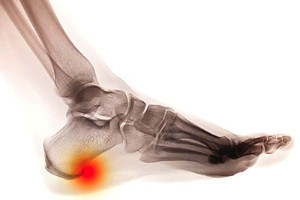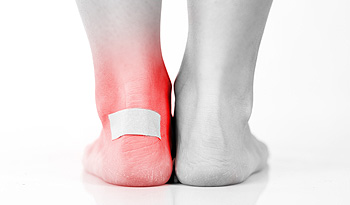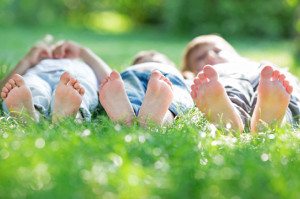Items filtered by date: October 2021
When Heel Spurs Become Painful
When the heel bone is under repeated stress, calcium deposits can form on the inside of it. These deposits, known as heel spurs, point towards the arch and can measure up to half an inch. Heel spurs can be associated with plantar fasciitis, and they are sometimes masked by the discomfort of that condition. Some heel spurs may not produce any symptoms, while others can be quite painful. You can try to get relief from a heel spur by using cold compresses or over-the-counter anti-inflammatories to reduce inflammation. Certain foot and calf stretches may also help to relieve pain as well. Patients who are struggling with heel pain that may be a heel spur should consult with a podiatrist. A podiatrist can diagnose the source of the pain and offer more advanced forms of treatment.
Heel spurs can be incredibly painful and sometimes may make you unable to participate in physical activities. To get medical care for your heel spurs, contact Dr. Ronald Sheppard from Warren-Watchung Podiatry Center. Our doctor will do everything possible to treat your condition.
Heels Spurs
Heel spurs are formed by calcium deposits on the back of the foot where the heel is. This can also be caused by small fragments of bone breaking off one section of the foot, attaching onto the back of the foot. Heel spurs can also be bone growth on the back of the foot and may grow in the direction of the arch of the foot.
Older individuals usually suffer from heel spurs and pain sometimes intensifies with age. One of the main condition's spurs are related to is plantar fasciitis.
Pain
The pain associated with spurs is often because of weight placed on the feet. When someone is walking, their entire weight is concentrated on the feet. Bone spurs then have the tendency to affect other bones and tissues around the foot. As the pain continues, the feet will become tender and sensitive over time.
Treatments
There are many ways to treat heel spurs. If one is suffering from heel spurs in conjunction with pain, there are several methods for healing. Medication, surgery, and herbal care are some options.
If you have any questions feel free to contact one of our offices located in Marlboro and Watchung, NJ . We offer the latest in diagnostic and treatment technology to meet your needs.
Are Bunions Affecting Your Everyday Life?
What Is an Achilles Tendon Rupture?
The Achilles tendon connects the heel bone with the calf muscles. It is the largest tendon in the body and is capable of absorbing a great deal of force. It is instrumental in helping the body walk, run, and stand up onto the toes. Under certain conditions, when the Achilles tendon is under severe stress, it may tear or rupture. This may be caused by playing sports such as tennis or basketball (which involve a lot of starting and stopping), being older or overweight, using steroids, or taking certain antibiotics. All of these factors can weaken the Achilles tendon and make it more susceptible to injuries. If you have ruptured your Achilles tendon, you may have severe pain or swelling near the heel, or you may be unable to stand on the affected leg. You may have even heard a popping sound at the moment of injury. There are a variety of treatment options available for a ruptured Achilles tendon. A podiatrist can determine what course of treatment is best for you after examining and diagnosing your condition.
Achilles tendon injuries need immediate attention to avoid future complications. If you have any concerns, contact Dr. Ronald Sheppard of Warren-Watchung Podiatry Center. Our doctor can provide the care you need to keep you pain-free and on your feet.
What Is the Achilles Tendon?
The Achilles tendon is a tendon that connects the lower leg muscles and calf to the heel of the foot. It is the strongest tendon in the human body and is essential for making movement possible. Because this tendon is such an integral part of the body, any injuries to it can create immense difficulties and should immediately be presented to a doctor.
What Are the Symptoms of an Achilles Tendon Injury?
There are various types of injuries that can affect the Achilles tendon. The two most common injuries are Achilles tendinitis and ruptures of the tendon.
Achilles Tendinitis Symptoms
- Inflammation
- Dull to severe pain
- Increased blood flow to the tendon
- Thickening of the tendon
Rupture Symptoms
- Extreme pain and swelling in the foot
- Total immobility
Treatment and Prevention
Achilles tendon injuries are diagnosed by a thorough physical evaluation, which can include an MRI. Treatment involves rest, physical therapy, and in some cases, surgery. However, various preventative measures can be taken to avoid these injuries, such as:
- Thorough stretching of the tendon before and after exercise
- Strengthening exercises like calf raises, squats, leg curls, leg extensions, leg raises, lunges, and leg presses
If you have any questions please feel free to contact one of our offices located in Marlboro and Watchung, NJ . We offer the newest diagnostic tools and technology to treat your foot and ankle needs.
Mystery Blisters on the Feet
You are going about your day, when suddenly you feel a pain in your foot. You look down and are surprised to find a blister. You don’t remember wearing tight shoes or exercising all day, so what could have caused this blister? While it’s true that most blisters are the result of friction, usually from shoes or socks rubbing repeatedly over a small area of skin during physical activity, there are other reasons that you may have developed a blister. These can include excessive moisture on the skin, sunburns, an allergic reaction, psoriasis, eczema, athlete’s foot, and even insect bites. If you have painful, unexplained blisters on your feet, it is strongly suggested that you seek the care of a podiatrist. This specialist can determine what caused the blisters and advise you on what you should do to treat them. For more information about treating and preventing foot blisters, please consult with a podiatrist.
Blisters are prone to making everyday activities extremely uncomfortable. If your feet are hurting, contact Dr. Ronald Sheppard of Warren-Watchung Podiatry Center. Our doctor can provide the care you need to keep you pain-free and on your feet.
Foot Blisters
Foot blisters develop as a result of constantly wearing tight or ill-fitting footwear. This happens due to the constant rubbing from the shoe, which can often lead to pain.
What Are Foot Blisters?
A foot blister is a small fluid-filled pocket that forms on the upper-most layer of the skin. Blisters are filled with clear fluid and can lead to blood drainage or pus if the area becomes infected.
How Do Blisters Form?
Blisters on the feet are often the result of constant friction of skin and material, usually by shoe rubbing. Walking in sandals, boots, or shoes that don’t fit properly for long periods of time can result in a blister. Having consistent foot moisture and humidity can easily lead to blister formation.
Prevention & Treatment
It is important to properly care for the affected area in order to prevent infection and ease the pain. Do not lance the blister and use a Band-Aid to provide pain relief. Also, be sure to keep your feet dry and wear proper fitting shoes. If you see blood or pus in a blister, seek assistance from a podiatrist.
If you have any questions, please feel free to contact one of our offices located in Marlboro and Watchung, NJ . We offer the newest diagnostic and treatment technologies for all your foot care needs.
Helping Your Child’s Feet Smell Better
Foot odor is caused by bacteria that feasts on oils and dead skin cells. These bacteria can collect and multiply easily in damp and dark places like sweaty shoes, socks, and sweaty feet, and then produce odorous organic acids during their process of dispelling waste. For some people, the type of bacteria they collect is called Kyetococcus sedentarius, which also produces volatile sulfur compounds and can be excessively rank. A key to avoiding or reducing putrid-smelling feet is keeping the feet as dry and clean as possible. Make sure your child washes their feet every day and especially after physical activity that causes them to sweat. Get them moisture-wicking socks that keep sweat off the skin and allow the feet to breathe. Check to make sure they wear fresh socks every day as well. Ensure that the shoes they wear are not too tight, and switch out shoes and sneakers every day to allow them to dry out before wearing them again. Don’t allow them to share footwear, socks, or towels with anyone. If you believe your child’s feet sweat excessively, they may have a condition known as hyperhidrosis which can be treated by a podiatrist who can also offer additional tips on foot hygiene and care.
Making sure that your children maintain good foot health is very important as they grow. If you have any questions, contact Dr. Ronald Sheppard of Warren-Watchung Podiatry Center. Our doctor can provide the care you need to keep you pain-free and on your feet.
Keeping Children's Feet Healthy
Having healthy feet during childhood can help prevent medical problems later in life, namely in the back and legs. As children grow, their feet require different types of care. Here are some things to consider...
Although babies do not walk yet, it is still very important to take care of their feet.
Avoid putting tight shoes or socks on his or her feet.
Allow the baby to stretch and kick his or her feet to feel comfortable.
As a toddler, kids are now on the move and begin to develop differently. At this age, toddlers are getting a feel for walking, so don’t be alarmed if your toddler is unsteady or ‘walks funny’.
As your child gets older, it is important to teach them how to take care of their feet.
Show them proper hygiene to prevent infections such as fungus.
Be watchful for any pain or injury.
Have all injuries checked by a doctor as soon as possible.
Comfortable, protective shoes should always be worn, especially at play.
If you have any questions please feel free to contact one of our offices located in Marlboro and Watchung, NJ . We offer the newest diagnostic and treatment technologies for all your foot and ankle needs.





